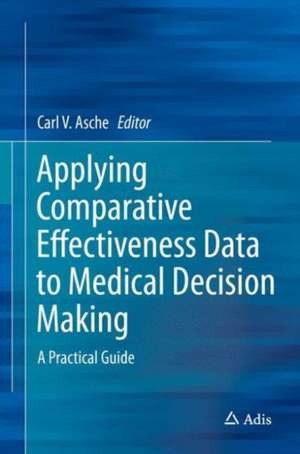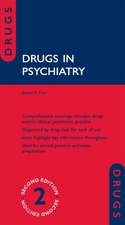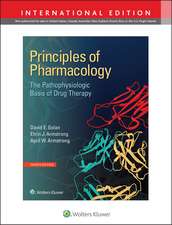Applying Comparative Effectiveness Data to Medical Decision Making: A Practical Guide
Editat de Carl Ascheen Limba Engleză Hardback – 7 dec 2015
The book considers, among other topics, evidence based medicine and the role of comparative effectiveness research in the development of medical guidelines, bias and confounding, quality of life, randomized controlled trials, analyses of retrospective databases, screening and economic evaluation. The book is intended to serve as a “what is it?”, “why do we need it?” and “how does it or could it effect positive change in health care?” rather than just a “how to?” technical overview. As such, it provides an essential resource for both under- and post-graduate students in health sciences.
| Toate formatele și edițiile | Preț | Express |
|---|---|---|
| Paperback (1) | 345.20 lei 38-44 zile | |
| Springer International Publishing – 26 mar 2019 | 345.20 lei 38-44 zile | |
| Hardback (1) | 367.47 lei 3-5 săpt. | |
| Springer International Publishing – 7 dec 2015 | 367.47 lei 3-5 săpt. |
Preț: 367.47 lei
Preț vechi: 386.81 lei
-5% Nou
Puncte Express: 551
Preț estimativ în valută:
70.32€ • 76.36$ • 59.07£
70.32€ • 76.36$ • 59.07£
Carte disponibilă
Livrare economică 02-16 aprilie
Preluare comenzi: 021 569.72.76
Specificații
ISBN-13: 9783319220642
ISBN-10: 3319220640
Pagini: 113
Ilustrații: VIII, 113 p. 16 illus., 12 illus. in color.
Dimensiuni: 155 x 235 x 15 mm
Greutate: 0.39 kg
Ediția:1st ed. 2016
Editura: Springer International Publishing
Colecția Adis
Locul publicării:Cham, Switzerland
ISBN-10: 3319220640
Pagini: 113
Ilustrații: VIII, 113 p. 16 illus., 12 illus. in color.
Dimensiuni: 155 x 235 x 15 mm
Greutate: 0.39 kg
Ediția:1st ed. 2016
Editura: Springer International Publishing
Colecția Adis
Locul publicării:Cham, Switzerland
Public țintă
GraduateCuprins
1. Introduction to Comparative Effectiveness Research.- 2. Randomized Controlled Trials.- 3. Observational Studies.- 4. Evaluating Published CER Evidence.- 5. Epidemiological Principles Applied to CER.- 6. The Question of Value.- 7. Medical Decision Making: When Evidence and Medical Culture Clash.- 8. The Value of Prevention.
Recenzii
“This is essential reading for researchers and healthcare professionals involved in making medical decisions, including physicians, midlevel practitioners, pharmacists, nurses, and other allied health professionals. … This is a thorough review of evidence-based medicine concepts and comparative effectiveness research that is easy to understand and offers a framework to support readers in determining how these concepts can be incorporated into their decision making methods in a practical and purposeful way.” (Valerie D. Barnes, Doody's Book Reviews, September, 2016)
Notă biografică
Dr. Carl Asche is the Director of the Center for Outcomes Research at the University of Illinois College of Medicine at Peoria, where he is a Research Professor both in the Departments of Medicine (Peoria) and Pharmacy Systems, Outcomes & Policy (Chicago). He is also a research affiliate with the University of Victoria Centre on Aging. His research focuses on the use of comparative effectiveness research and cost-effectiveness analysis in health care decision making. In addition to the present book,his academic work has comprised authoring or co-authoring of over 75 papers that appear in the medical and economic literature. He has presented his research at seminars and conferences both nationally and internationally. He has served on numerous national and international health economics focused editorial, grant review, advisory boards and committees. Dr. Asche’s research is funded by a variety of state/federal agencies and health system providers.
Textul de pe ultima copertă
This textbook introduces students to the basic concepts and methods used to measure and compare the expected benefits, risks and cost of preventive and therapeutic medical interventions. It provides an easily accessible overview of comparative effectiveness and its practical applications to daily medical decisions. The book includes learning objectives for each topic, definitions of key terms and topic summaries. Each chapter is written by a highly regarded academic and extensive reference is made throughout to other sources of literature where the interested reader can find further details.
The book considers, among other topics, evidence based medicine and the role of comparative effectiveness research in the development of medical guidelines, bias and confounding, quality of life, randomized controlled trials, analyses of retrospective databases, screening and economic evaluation. The book is intended to serve as a “what is it?”, “why do we need it?” and “how does it or could it effect positive change in health care?” rather than just a “how to?” technical overview. As such, it provides an essential resource for both under- and post-graduate students in health sciences.
The book considers, among other topics, evidence based medicine and the role of comparative effectiveness research in the development of medical guidelines, bias and confounding, quality of life, randomized controlled trials, analyses of retrospective databases, screening and economic evaluation. The book is intended to serve as a “what is it?”, “why do we need it?” and “how does it or could it effect positive change in health care?” rather than just a “how to?” technical overview. As such, it provides an essential resource for both under- and post-graduate students in health sciences.
Caracteristici
Easily accessible overview of comparative effectiveness
Learning objectives for each topic
Suggestions for further reading for each topic
Learning objectives for each topic
Suggestions for further reading for each topic




